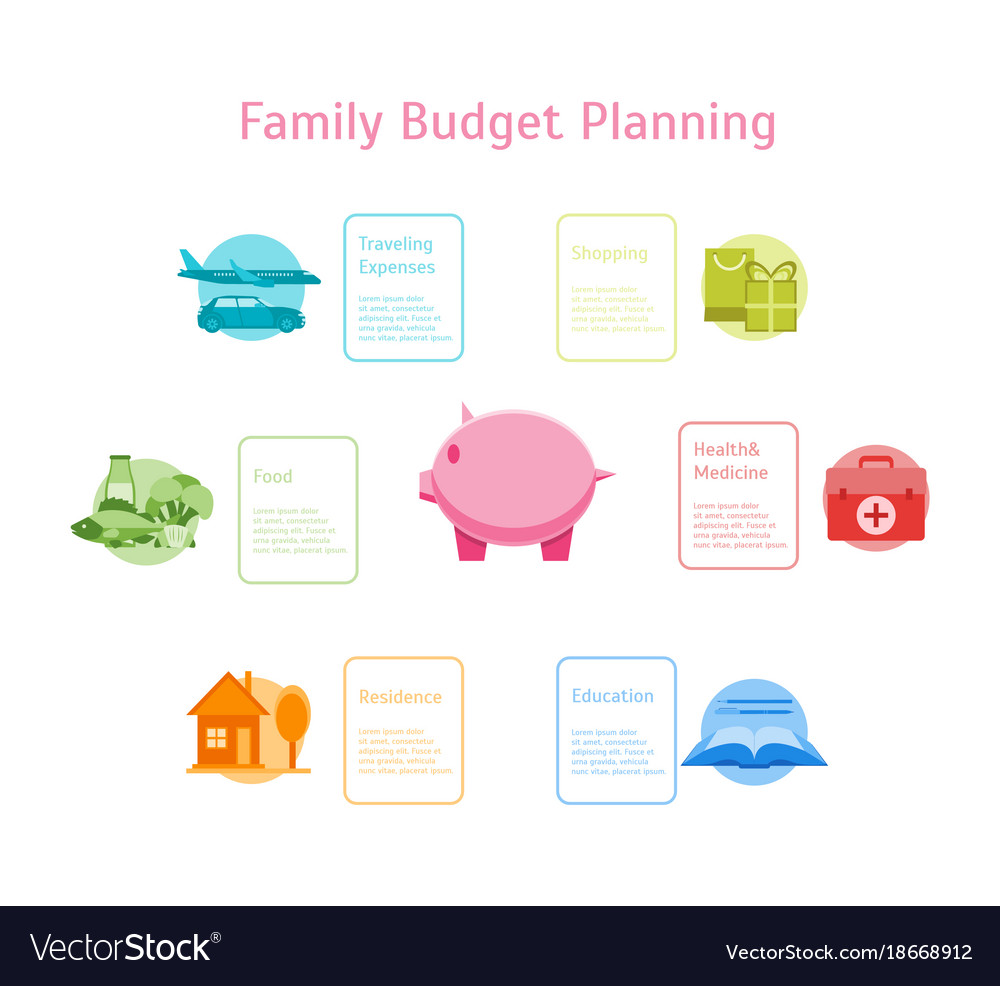Importance of Family Budgeting

Family budgeting is crucial for financial stability as it helps individuals and families keep track of their income and expenses. By creating a budget, families can prioritize their spending, save for the future, and avoid falling into debt. Here are some benefits of creating a family budget and the impact it has on overall financial health:
Control Spending and Avoid Debt
Creating a budget allows families to have a clear understanding of their financial situation. By tracking expenses and setting limits on spending in each category, families can avoid overspending and accumulating debt. This helps in maintaining financial stability and avoiding financial stress.
Save for Financial Goals
A family budget helps in identifying financial goals and allocating funds towards achieving them. Whether it’s saving for a vacation, buying a new home, or planning for retirement, having a budget in place ensures that families are working towards their goals systematically.
Emergency Preparedness
Effective budgeting enables families to set aside funds for emergencies or unexpected expenses. Having an emergency fund can provide a sense of security and peace of mind, knowing that there are resources available in case of unforeseen circumstances.
Improve Financial Literacy
By actively managing a family budget, individuals can improve their financial literacy and develop better money management skills. Understanding where money is being spent, how to prioritize expenses, and how to make informed financial decisions are essential aspects of financial well-being.
Build Wealth and Secure Future
Overall, family budgeting plays a significant role in building wealth and securing the financial future of a family. By consistently following a budget, families can work towards achieving financial independence, retirement goals, and long-term financial security.
Setting Financial Goals

Setting clear financial goals within a family budget is crucial for long-term financial stability and success. It provides direction, motivation, and a roadmap for making informed financial decisions. By aligning budgeting strategies with family goals, you can prioritize spending, save for the future, and work towards achieving your dreams as a family.
Importance of Setting Clear Financial Goals
- Setting financial goals helps families stay focused on their priorities and avoid unnecessary expenses.
- It allows for better planning and budgeting, ensuring that every dollar is allocated wisely.
- Financial goals provide a sense of accomplishment when achieved, motivating families to continue working towards their objectives.
Aligning Budgeting Strategies with Family Goals
- Start by identifying your family’s short-term and long-term financial goals, such as building an emergency fund, buying a house, or saving for retirement.
- Create a budget that reflects your priorities and allocates resources towards achieving those goals. Consider using tools like budgeting apps or spreadsheets to track your progress.
- Regularly review and adjust your budget to ensure it aligns with your changing family circumstances and goals.
Examples of Financial Goals for Families
- Short-term goals: Paying off credit card debt, saving for a family vacation, building an emergency fund, or starting a college fund for children.
- Long-term goals: Buying a home, saving for retirement, funding children’s education, investing in a business, or achieving financial independence.
Tracking Expenses
Tracking family expenses is crucial for effective budgeting. By monitoring where your money goes, you can make informed decisions to improve your financial situation.
Methods for Tracking Expenses
- Keep receipts and record transactions: Save receipts from purchases and keep a detailed record of all expenses.
- Use budgeting apps or software: Utilize technology to track expenses automatically and categorize spending.
- Maintain a spending journal: Write down daily expenses to have a clear picture of where your money is going.
Significance of Categorizing Expenses
Categorizing expenses helps you understand your spending habits better. By grouping expenses into categories such as groceries, utilities, entertainment, and transportation, you can identify areas where you may be overspending and make adjustments accordingly.
Analyzing Spending Patterns
- Identify trends: Look for patterns in your spending to see where you are consistently allocating the most money.
- Compare actual spending to budget: Evaluate how your actual expenses align with your budgeted amounts to adjust your financial plan if needed.
- Set goals for improvement: Once you identify areas for improvement, establish specific goals to reduce spending in those categories.
Creating a Realistic Budget
Creating a budget that accurately reflects your income and expenses is crucial for effective financial management. By following a few key steps, you can develop a realistic budget that aligns with your financial goals and priorities.
Allocating Funds for Essential Needs, Savings, and Discretionary Spending
When creating a budget, it’s important to prioritize your essential needs such as housing, utilities, groceries, and transportation. These expenses should be allocated first to ensure your basic needs are met. Next, designate a portion of your income towards savings to build an emergency fund and plan for future goals like buying a home or retiring comfortably. Finally, allocate funds for discretionary spending on non-essential items like dining out, entertainment, or shopping.
- Start by listing all sources of income and fixed expenses.
- Subtract your essential expenses from your income to determine how much you have left for savings and discretionary spending.
- Set specific percentages or amounts for each category to ensure you are staying within your means.
Adjust your budget as needed to accommodate changes in your financial situation, such as a pay raise, unexpected expenses, or a decrease in income.
Adjusting the Budget as Financial Circumstances Change
Life is unpredictable, and financial circumstances can change quickly. It’s essential to review and adjust your budget regularly to reflect any changes in income or expenses. By staying flexible and proactive, you can ensure that your budget remains realistic and effective in helping you achieve your financial goals.
- Regularly review your budget to track your spending habits and identify areas where you can cut back.
- Consider reallocating funds from discretionary spending to savings during lean months or when unexpected expenses arise.
- Be willing to make adjustments to your budget as needed to stay on track towards your financial goals.
Saving and Emergency Fund
When it comes to family budgeting, saving money and establishing an emergency fund are crucial components to ensure financial stability and security. By prioritizing savings, families can better prepare for unexpected expenses and work towards achieving their long-term financial goals.
Establishing an Emergency Fund
An emergency fund is a separate savings account specifically designated to cover unforeseen expenses such as medical emergencies, car repairs, or job loss. It acts as a safety net to prevent families from going into debt when unexpected financial challenges arise.
- Set a specific savings goal: Aim to save at least 3 to 6 months’ worth of living expenses in your emergency fund.
- Automate your savings: Set up automatic transfers from your checking account to your emergency fund to ensure consistent contributions.
- Keep your emergency fund accessible: Choose a high-yield savings account or money market account that offers easy access to your funds when needed.
- Replenish your fund: Once you use funds from your emergency fund, make it a priority to replenish the amount as soon as possible.
Incorporating Savings Goals into the Family Budget
Integrating savings goals into your family budget helps you track progress towards your financial objectives and ensures that saving becomes a regular habit.
- Identify your financial goals: Whether it’s saving for a new home, college tuition, or retirement, clearly define your savings objectives.
- Allocate a portion of your income to savings: Determine a set percentage of your income to save each month and treat it as a non-negotiable expense.
- Track your savings progress: Regularly monitor your savings account balances and adjust your budget as needed to stay on track with your goals.
- Celebrate milestones: Recognize and celebrate reaching savings milestones to stay motivated and encouraged to continue saving.
Managing Debt

Managing debt is a crucial aspect of maintaining a healthy family budget. Debt can have a significant impact on overall financial health, so it’s important to have strategies in place to manage and reduce it effectively while still meeting your other financial goals.
Strategies for Managing and Reducing Debt
When it comes to managing and reducing debt within a family budget, there are several strategies you can implement:
- Start by listing out all your debts, including the amount owed and the interest rates.
- Consider consolidating high-interest debts into a lower-interest loan or credit card to save on interest payments.
- Create a debt repayment plan by prioritizing debts with the highest interest rates or smallest balances first.
- Avoid taking on new debt while you’re working on paying off existing debts.
Impact of Debt on Overall Financial Health
Debt can have a significant impact on your overall financial health, affecting your ability to save, invest, and achieve financial goals. High levels of debt can lead to stress, financial instability, and difficulty in meeting everyday expenses.
Tips for Prioritizing Debt Payments
When prioritizing debt payments while maintaining your budget, consider the following tips:
- Allocate a specific amount of your budget towards debt repayment each month.
- Focus on paying off high-interest debts first to save money on interest in the long run.
- Consider using windfalls or extra income to make additional payments towards your debts.
- Negotiate with creditors to see if you can lower interest rates or set up more manageable payment plans.
Involving Family Members
Family budgeting becomes more effective when all family members are involved in the planning process. It helps in promoting financial literacy, responsibility, and teamwork within the family unit. Here are some strategies and tips for involving family members in budget planning:
Teaching Children about Budgeting
- Start early: Teach children about money management from a young age to instill good financial habits.
- Use real-life examples: Show children how budgeting works by involving them in simple financial decisions.
- Set savings goals: Encourage children to save a portion of their allowance or earnings towards specific goals.
- Lead by example: Demonstrate responsible spending and saving habits for children to emulate.
Fostering Open Communication
- Schedule regular family budget meetings: Discuss financial goals, challenges, and progress as a family.
- Encourage questions: Create a safe space for family members to ask about budgeting and finances without judgment.
- Share financial responsibilities: Allocate tasks like tracking expenses or researching cost-saving measures to different family members.
- Celebrate achievements: Recognize and celebrate milestones reached through effective budgeting and financial planning.